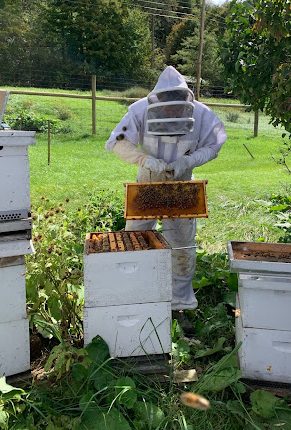Buzzing News on Beekeeping Club
Located within Colgate University’s own community garden resides several bee hives that seniors Emma Gallagher and Sara Fraser, along with sophomore Charlie Tourbaf, have been trying to revive. As warm weather slowly approaches, the Beekeeping Club seeks to use these bees to educate those interested in their positive impact on the local community.
“[T]he club just aims to get more students involved in beekeeping. It’s kind of a niche activity that we want to make more accessible to the students here while we have access to hives the university has generously provided us and also to […] encourage awareness around [that] beekeeping can be used not just as a fun hobby or a way to get delicious honey but also as a way to protect the environment, [promote] pollination [and understand] how fundamental they are to food structures and the environment as a whole,” Gallagher explained.
Students will have to wait until the season formally starts, but once it does, they can sign up to visit the hive, learn how to care for the bees, and later extract honey from them. Tourbaf discussed some future programming he hopes to start as well.
“I actually talked to Julia Sparks in the Office of Sustainability about setting up a potential PE credit where you could learn about gardening and beekeeping and […] composting and stuff like that,” Tourbaf said. “[The goal would be] to get people who are interested in and know how to bee keep to keep the club running. There’s a class going on [nearby] about how to bee keep, so if people are interested we would do that […] I think we talked a little bit about maybe [getting] involved with ’13 Days of Green’ and [being] a part of some event on campus for that.”
The COVID-19 pandemic created difficulties for the club, as students could not even visit the hive as an activity, meaning the team had to get creative with its meetings, which happened over Zoom. In the end, one of these virtual gatherings ended up becoming a favorite memory for Gallagher.
“We sent out little care packages like jars of honey to people who signed up for this activity we did over Zoom where we decorated little jars of honey with markers and cool stuff. [W]e also got people socks and things and we’ve done other stuff like learning to cook with honey, learning to make a lot of beauty products and [learning] ways you can fix your acne with honey,” Gallagher said. “I feel like a lot of people there were very like-minded in [not only] their willingness to try beekeeping and get involved in the hives but also in talking about the environment and ways we like to go outdoors […] [It] showed that the purpose and the mission of the club can go beyond just physically being there but [includes] this passion we all have for environmentalism and nature.”
While Gallagher and Tourbaf have had experiences with beekeeping before coming to Colgate, having personal hives at home themselves, Fraser signed up during her first year on campus. Learning the honey offered in Frank Dining Hall was from the hive had further piqued her interest.
“It’s crazy because I’ve never done any of this before — I just thought it was interesting […] but that time we went to the hives was really cool just because I had never seen that being done before,” Fraser said. “[Later on] I applied to be on leadership […] during COVID and then just somehow ended up being president of the beekeeping club [which] has exposed me to a lot of new and valuable information and has been an extremely rewarding experience.”
Students can learn about the specifics of what needs to be completed over the course of the year for beekeeping, which Tourbaf outlined.
“Responsibilities vary from season to season. In the fall, it’s all about checking honey stores […] If the bees do not have enough honey, you can supplement them with sugar water […] We also prep the hive for the winter by putting up mouse guards […] to prevent mice or other small mammals from living in there and stealing honey,” Tourbaf explained. “During the spring, it is all about growing the hive and productivity to recover from any losses in population over the winter months […] If there is a surplus of honey, at the end of the fall and spring seasons we collect that honey and filter it for consumption.”
Interested students should reach out to join the mailing list as things should be picking up shortly, as the club seeks to have a variety of activities later this semester.
“[The club is a] low commitment […] in the sense that there are no meetings right at this moment outside of optional activities like hive checks and cooking classes […] and just good to stay on the email list so you’re aware of what we’re doing. And also we’re hoping to get Instagram started back up again soon so keep your eyes peeled for that,” Fraser said.
Sara Fraser is a junior from Memphis, TN concentrating in environmental studies with a minor in sociology. She has previously served as a staff writer...








